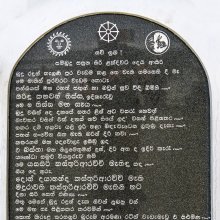Mahashaya, Mahāśaya, Maha-ashaya: 10 definitions
Introduction:
Mahashaya means something in Hinduism, Sanskrit, Hindi. If you want to know the exact meaning, history, etymology or English translation of this term then check out the descriptions on this page. Add your comment or reference to a book if you want to contribute to this summary article.
The Sanskrit term Mahāśaya can be transliterated into English as Mahasaya or Mahashaya, using the IAST transliteration scheme (?).
Alternative spellings of this word include Mahashay.
Images (photo gallery)
Languages of India and abroad
Sanskrit dictionary
Source: DDSA: The practical Sanskrit-English dictionaryMahāśaya (महाशय).—a. highsouled, nobleminded, magnanimous, noble; दैवात् प्रबुद्धः शुश्राव वराहो हि महाशयः (daivāt prabuddhaḥ śuśrāva varāho hi mahāśayaḥ) Ks; राजा हिरण्यगर्भो महाशयः (rājā hiraṇyagarbho mahāśayaḥ) H.4; see महात्मन् (mahātman). (-yaḥ) 1 a noble-minded or magnanimous person; महाशयचक्रवर्ती (mahāśayacakravartī) Bv.1.7.
2) the ocean.
Mahāśaya is a Sanskrit compound consisting of the terms mahā and āśaya (आशय).
Source: Cologne Digital Sanskrit Dictionaries: Shabda-Sagara Sanskrit-English DictionaryMahāśaya (महाशय).—mfn.
(-yaḥ-yā-yaṃ) Magnanimous, liberal, munificent. m.
(-yaḥ) 1. The ocean. 2. A gentleman, sir. E. mahā great, āśaya purpose or an abode.
--- OR ---
Mahāśayā (महाशया) or Mahāśayyā.—f.
(-yā) A throne, a regal seat. E. mahā great, and śayā bed or couch.
Source: Cologne Digital Sanskrit Dictionaries: Benfey Sanskrit-English DictionaryMahāśaya (महाशय).—I. adj. 1. magnanimous; 2. liberal. Ii. m. a gentleman.
Mahāśaya is a Sanskrit compound consisting of the terms mahā and āśaya (आशय).
Source: Cologne Digital Sanskrit Dictionaries: Cappeller Sanskrit-English DictionaryMahāśaya (महाशय).—1. [masculine] the sea (lit. great receptacle).
--- OR ---
Mahāśaya (महाशय).—2. [adjective] high-minded, magnahimous.
Source: Cologne Digital Sanskrit Dictionaries: Monier-Williams Sanskrit-English Dictionary1) Mahāśaya (महाशय):—[from mahā > mah] m. (hāś) ‘great receptacle’, the ocean, [cf. Lexicographers, esp. such as amarasiṃha, halāyudha, hemacandra, etc.]
2) [=mahā-śaya] [from mahāśaya > mahā > mah] mfn. having a noble disposition, high-minded, magnanimous, noble, liberal, open, unsuspicious, [Aṣṭāvakra-saṃhitā; Hitopadeśa; Kathāsaritsāgara] etc.
3) [v.s. ...] m. a respectable person, gentleman (sometimes a term of respectful address = Sir, Master), [Monier-Williams’ Sanskrit-English Dictionary]
Source: Cologne Digital Sanskrit Dictionaries: Yates Sanskrit-English Dictionary1) Mahāśaya (महाशय):—[mahā+śaya] (yaḥ-yā-yaṃ) a. Magnanimous, liberal. m. The ocean; Sir.
2) Mahāśayā (महाशया):—[mahā-śayā] (yyā) 1. f. A throne.
[Sanskrit to German]
Sanskrit, also spelled संस्कृतम् (saṃskṛtam), is an ancient language of India commonly seen as the grandmother of the Indo-European language family (even English!). Closely allied with Prakrit and Pali, Sanskrit is more exhaustive in both grammar and terms and has the most extensive collection of literature in the world, greatly surpassing its sister-languages Greek and Latin.
Hindi dictionary
Source: DDSA: A practical Hindi-English dictionaryMahāśaya (महाशय) [Also spelled mahashay]:—(a and nm) noble, liberal (person); a form of address meaning- Mr.
...
Kannada-English dictionary
Source: Alar: Kannada-English corpusMahāśaya (ಮಹಾಶಯ):—
1) [noun] a large-hearted, generous, kindly man.
2) [noun] a respectful term of addressubg a man.
3) [noun] a sea.
Kannada is a Dravidian language (as opposed to the Indo-European language family) mainly spoken in the southwestern region of India.
See also (Relevant definitions)
Partial matches: Saya, Ashaya, Maha.
Starts with: Mahashayana.
Full-text: Makacayam, Mahashayya, Mahashay, Mahanubhava, Yukteswar Giri, Bhajana Rahasya, Ashaya.
Relevant text
Search found 8 books and stories containing Mahashaya, Mahāśaya, Maha-ashaya, Mahā-āśaya, Mahasaya, Maha-asaya, Mahāśayā, Maha-shaya, Mahā-śaya, Maha-saya, Mahā-śayā; (plurals include: Mahashayas, Mahāśayas, ashayas, āśayas, Mahasayas, asayas, Mahāśayās, shayas, śayas, sayas, śayās). You can also click to the full overview containing English textual excerpts. Below are direct links for the most relevant articles:
Brihad Bhagavatamrita (commentary) (by Śrī Śrīmad Bhaktivedānta Nārāyana Gosvāmī Mahārāja)
Verse 2.4.149-150 < [Chapter 4 - Vaikuṇṭha (the spiritual world)]
Verse 2.3.170 < [Chapter 3 - Bhajana (loving service)]
Verse 1.1.38-39 < [Chapter 1 - Bhauma (the earthly plane)]
Chaitanya Bhagavata (by Bhumipati Dāsa)
Verse 3.3.66 < [Chapter 3 - Mahāprabhu’s Deliverance of Sarvabhauma, Exhibition of His Six-armed Form, and Journey to Bengal]
Verse 3.9.21 < [Chapter 9 - The Glories of Advaita]
Verse 3.3.10 < [Chapter 3 - Mahāprabhu’s Deliverance of Sarvabhauma, Exhibition of His Six-armed Form, and Journey to Bengal]
Bhajana-Rahasya (by Srila Bhaktivinoda Thakura Mahasaya)
Foreword (translated from the Hindi edition)
Text 18 < [Chapter 3 - Tṛtīya-yāma-sādhana (Pūrvāhna-kālīya-bhajana–niṣṭhā-bhajana)]
Yoga-sutras (Ancient and Modern Interpretations) (by Makarand Gopal Newalkar)
Sūtra 2.1-2 [Kriyāyoga] < [Book II - Sādhana-pāda]
Part 7 - Comparative analysis of commentaries on Pātañjala Yogasūtra < [Conclusion]
Shri Gaudiya Kanthahara (by Srila Bhaktisiddhanta Sarasvati)
The Agni Purana (by N. Gangadharan)
